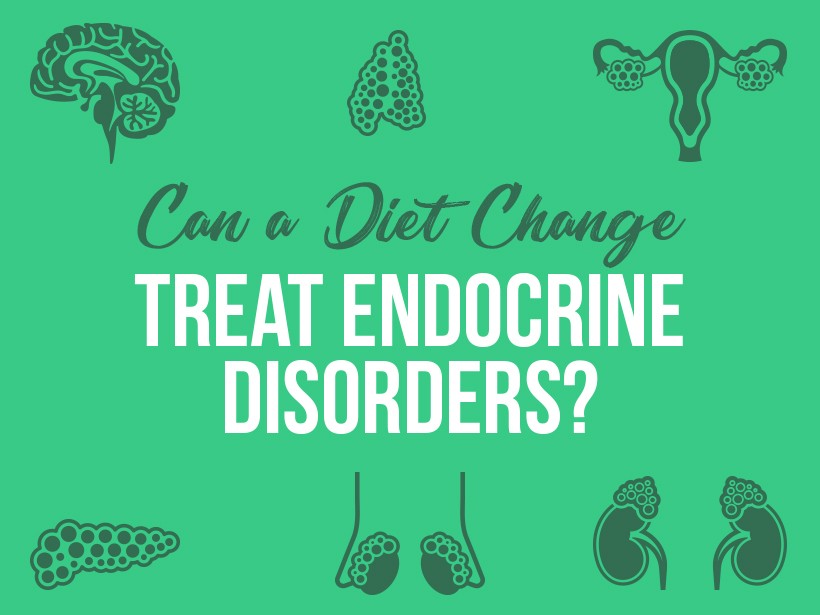The ketogenic diet is a high-fat, low-carb diet that triggers the metabolism of lipids in your body. Interestingly enough, it just might be the solution to a variety of endocrine disorders. To date, this diet has been studied to treat a number of disorders: neurological disorders, traumatic brain injury, acne, cancer, and metabolic disorders. Now, researchers are looking into the ketogenic diet and what effect it has on endocrine disorders.
Treating the Big Disorders
What are these specific endocrine disorders? They include diabetes, obesity, metabolic syndrome, and polycystic ovary syndrome. In diabetes, specifically type 2 diabetes, patients may produce insulin, but the cells become resistant to it.1 Researchers have demonstrated that lipid metabolism could actually help glucose transporters form at the membranes of cells, promote recycling, and alleviate particular inflammatory pathways due to the release of specific cytokines. Furthermore, with plasma ketones, plasma glucose decreases, cerebral metabolism of glucose slows down, and cerebral metabolism of acetoacetate increases.2 In obese patients, a high ketogenic diet lowers blood sugar and allows for better glycemic control. In those ketogenic diets in which patients consume high levels of protein, hunger and food intake decreases.
Keep it Simple
Now, to decode all the fancy science lingo, the little channels that take the glucose into your cells aren’t there in these patients. That’s why cells are resistant. The channels don’t recycle in the cells, so they aren’t presented. Meanwhile, inflammation via cytokines (which are little molecules that basically puff up your skin and other organs) decreases. It’s a side effect of obesity that the ketogenic diet can improve upon. Also, in diabetic patients, if the glucose cannot be absorbed, where does it go? It stays in the blood and causes a whole host of issues. But with ketones, the glucose decreases, and the brain can start metabolizing other substrates.
Down With Obesity
As explained earlier, the ketogenic diet improves obese conditions. This is really helpful because obesity is associated with other negative symptoms, like cardiovascular disease. However, by controlling appetite and essentially “starving” the body of what makes body fat, obese patients can lose weight while still feeling satiated.3
A Little Less Sugar
Insulin resistance can lead to hyperglycemia, hyperinsulinemia, abnormal metabolism of fatty acids, and cardiovascular diseases which are essentially a result of metabolic syndrome. Your metabolism refers to how your body breaks down things you put into it. Studies have shown that long-term use of the ketogenic diet actually decreases body weight, triglycerides, and blood pressure while increasing good macromolecules like high-density lipoproteins.4 Not to mention, plasma cholesterol levels decrease and liver cholesterol synthesis biomarkers decrease.
Reproductive Success
Last but not least, polycystic ovary syndrome is associated with obesity, hyperinsulinemia, insulin resistance, and metabolic syndrome. Polycystic ovary syndrome basically refers to a condition where women of reproductive age have infrequent or prolonged menstrual periods and excessive male hormone levels.5 Studies have shown that dietary intervention with the ketogenic diet has beneficial impacts on treatment of patients with polycystic ovary syndrome.6
These studies are pioneering in the field of endocrinology. Who knew a simple lifestyle change of consuming more lipids than carbs could potentially improve serious disorders like diabetes or polycystic ovary syndrome!
NUTRITIONAL DISCLAIMER
The content on this website should not be taken as medical advice and you should ALWAYS consult with your doctor before starting any diet or exercise program. We provide nutritional data for our recipes as a courtesy to our readers. We use Total Keto Diet app software to calculate the nutrition and we remove fiber and sugar alcohols, like erythritol, from the total carbohydrate count to get to the net carb count, as they do not affect your blood glucose levels. You should independently calculate nutritional information on your own and not rely on our data. The website or content herein is not intended to cure, prevent, diagnose or treat any disease. This website shall not be liable for adverse reactions or any other outcome resulting from the use of recipes or recommendations on the Website or actions you take as a result. Any action you take is strictly at your own risk.
- Research Shows Improvement in Anorexia Nervosa Condition With Keto - August 6, 2018
- New Potential for Ketogenic Diet to Prevent Alcohol Withdrawal Syndrome - August 1, 2018
- Woman on Early Menopause Saved By Keto - July 25, 2018




